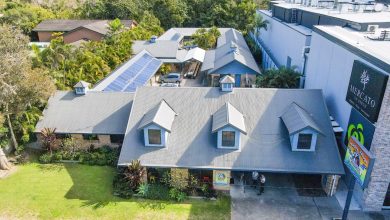
Assessing the value of the manager’s lot(s)
The most appropriate method of assessing the value of the real estate in each business is the direct comparison approach.
 |
Tod Gillespie, |
The inclusion of office/receptions, storage areas and the like in a management rights property can either be via these areas being included as freehold title (included within the management unit or as separate areas) or the manager having exclusive use rights to these facilities which are normally part of the common property of the complex.’
 |
| Click here to download as a PDF |
The classification of commercial floor areas as either freehold title or exclusive use is based on reference to the survey plan or community management scheme and their associated by laws.
A complex that primarily provides permanent lettings does not have as high a requirement for office/reception and storage areas as a complex used for holiday lettings that require additional work areas to run the letting business efficiently.
Besides whether a prospective buyer ‘likes’ the property as a future home, there are two components to every management rights for buyers to take into account when looking to purchase a management letting rights:
- The residential component and
- The commercial component.
The process the valuer takes and the consideration we have follows.
Community management statement
The first aspect the valuer will refer to is whether the property is indeed the legal manager’s unit. While the CMS provides a number of important functions, the most of interest to the incoming buyer should be that it will have clauses the say something like:
“Lot 1 may be utilised as both a residence and an office for the conduct of the caretaking/management of the common property and letting of the lots within the complex. Furthermore, no other lots may be utilised for letting purposes other than the owner/occupier of Lot 1.”
Without this clause, other owners in the complex may be able to operate a letting business in competition with the incumbent manager. Your legal due diligence will cover this.
The next item of importance from a valuer’s perspective is what exclusive use areas have been identified within the CMS. This will be explained further below.
Residential component
The residential component is not unlike the valuation of any residential property whereby the living component of the unit is compared directly to other residential units, either within the subject complex or to external properties that are in a similar location.
The residential unit will typically have one of the following title scenarios:
- Group title plan – The group title lot is effectively a parcel of land inside a townhouse, villa or housing complex/estate. The property within the boundary of the group title lot is wholly owned by the proprietor – that is, includes the building and any yard that surrounds the property.
- Building units plan – Under a BUP, the proprietor only owns what is within the BUP or building area. In most cases, this would include the living and balcony or patio areas, however, in some cases it only includes the building and the patio or balcony or even the office may be exclusive use.
- Survey plan – The BUP and GTP have been replaced with survey plans. The main difference with modern survey plans and the BUP and GTP above is the lot entitlement and by-laws are within the CMS now.
Other than this, a building format survey plan mirrors the BUP as above and standard format survey plan the GTP.
Commercial component
A property’s commercial area can vary considerably and they range from a small business that has no office or reception, to those complexes that have an extensive office/reception, restaurant, bar and conference facilities. The added worth of the commercial entitlements can vary significantly between holiday letting and permanent letting management rights complexes.
The inclusion of separate office/reception is very important for management rights complexes and without these facilities, the business could not really function, however, permanent complexes can survive with facilities of lesser scale.
The most valuable form of tenure for these is on title whereby they are wholly owned by the proprietor of the lot. Should these areas not be on title within either the GTP, BUP or survey plan, their use and ownership would be determined by way of either exclusive use or occupational authority.
Exclusive use
- Exclusive use is found within the community management statement whereby each lot is nominated in a schedule along with any areas that have been deemed as exclusive use for that lot and identified in a plan that would be annexed.
- Exclusive use is considered as the next most valuable ownership scenario after being on title.
- Occupation authority
- Section 134 of the Accommodation Module provides that the body corporate may enter into an occupation authority with the caretaker or letting agent to grant use of common property for purposes connected with their caretaking and letting functions. Section 134(7) further provides that a caretaker or letting agent may acquire rights to occupy common property only via section 134.
- Occupation authority is granted by way of either the caretaking or letting agreements or both and the proprietor’s interests in the area that is granted is terminable. When the agreements expire, so does the permitted use of that area. This is the least valuable of the tenure scenarios in Queensland as it’s use is terminable, that is has a defined date when you can no longer use it.
What does all this mean?
When purchasing a management rights, it is important to establish what you do and what you do not own. In many cases, we have valued property whereby the manager has shown us either that they are adamant are either on title or exclusive use, however, in some cases, are not and are merely common property that they have keys or access to.
Examples of issues that we have recently advised both buyers and sellers in relation to these titling issues are as follows:
- A games room with income to manager was built in two car spaces owned by two other units
- Linen room constructed in another unit owners car space
- Office was surveyed incorrectly so 50% was exclusive use and 50% had to be granted occupation authority as it was on common property.
Such scenarios will cause the incoming manager angst and possibly a loss of profits plus most likely upset the body corporate and any owners directly affected. Should any of the rooms that are necessary operate be only common property, and should there be any dispute with the body corporate, it would be possible for the onsite manager to be refused access to those areas which would severely inhibit the successful operation of the business.
The best advice is to seek clarity from the start.
As a wise man told me ‘certainty equals value’.





